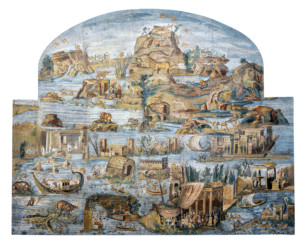
This year, the Classical Association, which promotes research, teaching, and popularisation of classical subjects especially in the UK, organises its annual conference at the University of Cambridge on 21—23 April 2023. The conference will welcome hundreds of classical scholars from around the world, and the Classical Association will use the occasion to celebrate its 120th anniversary.
As a group of five Finnish classical scholars, we assembled two separate panels that were both accepted as a part of the conference program. Doctoral researchers Juha Isotalo, Maria Jokela, and Joonas Vanhala will represent the University of Turku, and postdoctoral researchers Saara Kauppinen and Jasmin Lukkari will represent the University of Helsinki. These types of big, international conferences are an important opportunity to present one’s current research project and to receive feedback from an expert audience.
Our panels will deal with discourses of Otherness in ancient Greece and Rome. In historical research, the ‘Other’ is typically used to designate a group that is external to, or a minority in, any given society or culture. The purpose of othering discourses usually is to create a juxtaposition that sets ‘us’ and ‘them’ as opposites to one another and to use this to strengthen one’s own identity. Such othering discourses are always topical: recent years, for example, have seen a marked increase of othering discourses in the Western media, directed towards the east of Europe.
The subject of our first conference panel is Otherness in ancient Greece. The panel’s participants Juha Isotalo, Saara Kauppinen, and Eddie Jones – a reinforcement from Oxford – will discuss different categories of Otherness – such as foreigners, that is, non-Greeks, and practitioners of magic – in Greek literature, papyri, and curse tablets.
Juha Isotalo’s doctoral research concerns the Greek historian Herodotus’ concept of truth and his use of sources. In this panel in particular, his subject is the power dynamic between the author and the sources in Persian and Athenian ethnographies. Herodotus, as the author of the narrative, has a position of power over his sources. Isotalo studies, through the narrative devices used by Herodotus, how the author used this power by emphasising or omitting aspects of his choice.
Saara Kauppinen is currently working on a project that focuses on ritual language and its (believed) power in Ancient Graeco-Roman Magic. In her CA conference paper, she will show how certain elements of language could be used both in the accusations and in the self-claims of magic. When claims of magic were used for labeling other groups or individuals, elements such as foreignness and secrecy could be framed as harmful, whereas they could be utilized by the ritual practitioners themselves in emphasising their ritual power and hence convincing the clientele of their expertise. With such strategies, the ritual experts could perhaps “own” the otherness attached to them from the outside.
The subject of the second conference panel is cultural stereotypes in Roman literature. Maria Jokela, Jasmin Lukkari, and Joonas Vanhala will discuss Roman stereotypes of foreigners as well as the stereotypes between the Eastern and the Western parts of the Roman Empire, separated from each other during Late Antiquity.
Maria Jokela has recently started her doctoral dissertation on the stereotypes between the ‘East’ and the ‘West’ in Late Antiquity and Early Middle Ages. Her study concerns the history of the later Roman Empire and how during this era the different parts of the Empire – once unified – became estranged from each other to the extent that deep prejudices were born between the two and the common past was forgotten. These prejudices still persist. The estrangement between the East and the West is a very current subject which however has a very long history.
Jasmin Lukkari will present a part of her recently finished doctoral dissertation which deals with othering descriptions of Hellenistic kings in Roman Republican era historical narratives. In her research, Lukkari has specially focused on how these othering descriptions were not always negative, but they could as well be positive. In the conference paper, the Numidian king Masinissa will function as an example of this: the Romans praised him for not matching the negative Numidian stereotype. During the crises of the Late Roman Republic, the purpose of the negative and the positive othering discourses both was the same: redefinition of ‘Romanness’ by comparing it to the Others.
Joonas Vanhala’s doctoral dissertation focuses on Roman insults and stereotypes in the poems of Martial and in Pompeian wall inscriptions. At the conference, he will speak about the Greek Other in Martial’s poems. In the Roman literary sources, Greeks were often portrayed as a corrupting and amoral influence on Roman society. In his presentation, Vanhala will examine some of the most common ways in which Martial employs these Roman ideas of the Greek Other in his satirical poems, and how this reflects the prejudice against the Greeks among the Romans in the first century CE.
Click here to learn more about the conference.
Click here to learn more about the The Classical Association.
Learn more about the TelepART funding programme here.

Details from the Roman 1st century BC ‘Nile mosaic of Palestrina’ that depicts Egypt from Roman point of view.
Text: Juha Isotalo, Maria Jokela, Joonas Vanhala, Saara Kauppinen and Jasmin Lukkari
